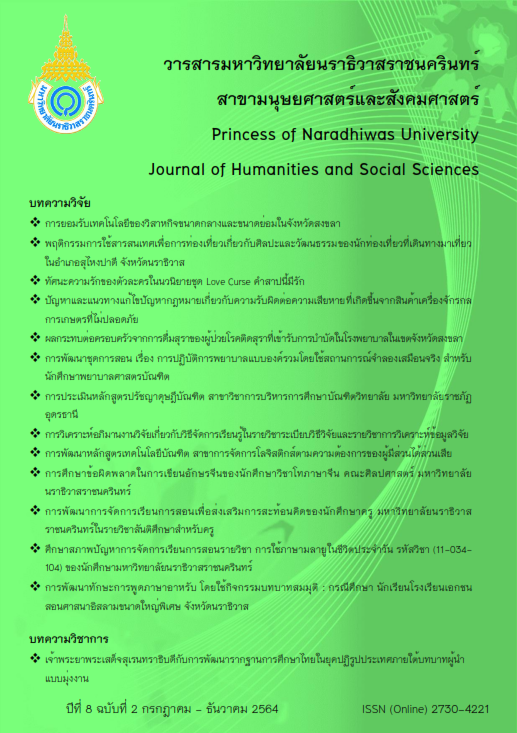Development of Instructional Package on Holistic Nursing Practice using Simulation-Based Learning for Nursing students
Main Article Content
Abstract
The research study aimed 1) to develop the instructional package on the topic of holistic nursing practice using Simulation-based learning for nursing students, in which the instructional learning was set as having efficiency according to the standard criterion of 80/80; 2) to compare learning performance in Principles and techniques in nursing: holistic nursing practice before and after using the instructional package, and 3) to study students’ satisfaction towards the instructional package. The sample in this research was 133 second-year nursing students enrolled in the Principles and techniques in nursing course. The instruments consisted of a researcher-developed instructional package on the topic of holistic nursing practice using Simulation-based learning for nursing students, questionnaires assessing holistic nursing skills, achievement test and satisfaction questionnaire on the instructional package learning. The data were analyzed using descriptive statistics (means and standard deviations) and paired t-test.
The study revealed the following results: 1) The researcher-developed instructional package had a level of efficiency at 82.16/86.42 within 80/80 criterion. 2) The learning achievement score in Principles and techniques in nursing on the topic of holistic nursing practice for the 2nd year nursing students after using the instructional package was significantly higher than that before using the instructional package (p <.001). The overall score of students’ satisfaction on learning with the instructional package was ranked at a high level.
The results of this research recommend to use the instructional package on the topic of holistic nursing practice using Simulation-based learning for teaching nursing students.
Article Details
References
ดวงกมล หน่อแก้ว. (2558). การเรียนรู้โดยใช้สถานการณ์เสมือนจริงทางพยาบาลศาสตร์ศึกษา. วารสารวิทยาลัยพยาบาลบรมราชชนนี กรุงเทพ, 31(3), 112-122.
บุญเกื้อ ควรหาเวช. (2543). นวัตกรรมการศึกษา. กรุงเทพฯ: SR printing.
วิทยาลัยพยาบาลบรมราชชนนี สุราษฎร์ธานี. (2563). หลักสูตรพยาบาลศาสตรบัณฑิต หลักสูตรปรับปรุง พ.ศ. 2560. สุราษฎร์ธานี: วิทยาลัยพยาบาลบรมราชชนนี สุราษฎร์ธานี.
ยุทธชัย ไชยสิทธิ์. (2556). การประยุกต์ใช้แบบแผนสุขภาพในการพยาบาลผู้ติดเชื้อเอชไอวีแบบองค์รวมตามหลักฐานเชิงประจักษ์. วารสารสมาคมพยาบาลฯ สาขา ภาคตะวันออกเฉียงเหนือ, 31(2), 100-110.
วงเดือน สุวรรณคีรี, อรพิน จุลมุสิ, และฐิติอาภา ตั้งค้าวานิช. (2559). การจัดการเรียนรู้โดยใช้สถานการณ์จำลองสำหรับนักศึกษาพยาบาล. วารสารพยาบาลศาสตร์ จุฬาลงกรณ์มหาวิทยาลัย, 28(2), 1-14.
ศศิกัญญา ดอนดีไพร, และนวลศรี ชำนาญกิจ. (2555). การพัฒนาชุดการสอนวิชาวิทยาศาสตร์ เรื่อง การแยกสารสำหรับนักเรียนชั้นมัธยมศึกษาปีที่ 2. วารสารวิชาการบัณฑิตศึกษา มหาวิทยาลัยราชภัฎนครสวรรณ์, 7(18), 115-130.
ศุภลักษณ์ ธนาโรจน์. (2560). การสอนโดยการจำลองสถานการณ์เสมือนจริง ในรายวิชาปฏิบัติหลักการและเทคนิคการพยาบาล. วารสารวิทยาลัยพยาบาลบรมราชชนนี อุตรดิตถ์, 9(2), 70-84.
สุธิศา ล่ามช้าง, และสมจิต เกียรติวัฒนเจริญ. (2558). ผลของสื่อมัลติมีเดียและการฝึกปฏิบัติกับหุ่นต่อความรู้และความมั่นใจในการปฏิบัติการพยาบาลเด็กป่วยด้วยโรคทางเดินหายใจเฉียบพลันของนักศึกษาพยาบาล. วารสารพยาบาลสาธารณสุข, 29(2), 29-42.
สำนักงานเลขาธิการสภาการศึกษา. (2560). แผนการศึกษาแห่งชาติ พ.ศ. 2560-2579. กรุงเทพฯ: พริกหวานกราฟฟิค.
สมจิตต์ สินธุชัย, และกันยารัตน์ อุบลวรรณ. (2560). การเรียนโดยใช้สถานการณ์จำลองเสมือนจริง: การนำไปใช้ในการจัดการเรียนการสอน. วารสารพยาบาลทหารบก, 18(1). 29-38.
อุไร หัถกิจ, และวารีรัตน์ ถาน้อย. (2555). การพยาบาลองค์รวมและการดูแลสุขภาพแบบผสมผสาน: การบูรณาการแนวคิดสู่การจัดการศึกษาพยาบาล. วารสารสภาการพยาบาล, 27 (ฉบับพิเศษ), 5-17.
อุไร หัถกิจ, และประภาพร ชูกำเนิด. (2558). ปัจจัยที่มีความสัมพันธ์กับการปฏิบัติการพยาบาลที่ผสมผสานภูมิปัญญาตะวันออก. วารสารพยาบาลสงขลานครินทร์, 35, 1-14.
Callister, L. C., Bond, A. E., Matsumura, G. & Mangum, S. (2004). Threading spirituality throughout nursing education. 18(3), 160-166.
Cordeau, M. A. (2013). Teaching holistic nursing using clinical simulation: A pedagogical essay. Journal of Nursing Education and Practice, 3(4), 40-50.
Downey M. (2007). Effects of holistic nursing course: a paradiam shift for holistic health practices. Journal of holistic nursing. 25(2), 119-144.
Fanning, R. M. & Gaba, D. M. (2007). The Role of Debriefing in Simulation Based Learning. Society for Simulation in Healthcare, 2(2), 115-125.
Hoffert, D. Henshaw, C. Mvududu, N. (2007). Enhancing the ability of nursing students to perform a spiritual assessment. Nurse Educator. 32(2), 66-72.
Jeffries, P. R. (2005). A framework for designing, implementing, and evaluating simulations used as teaching strategies in nursing. Nursing Education Perspectives, 26(2), 96-103.
Jones, I. & Alinier, G. (2009). Introduction of a new reflective framework to enhance students’ simulation learning: a preliminary evaluation. Hatfield, England: University of Hertfordshire.
Klipfel, J. M., Carolan, B. J., Brytowski, N., Mitchell, C. A., Gettman, M. T. & Jacobson, T. M. (2014). Patient safety improvement through in situation simulation interdisciplinary team training. Urologic Nursing, 34(1), 39-46.
Leeuwen, V., Tiesinga, J., Middel, B., Post, D. & Jochemsen, H. (2008). The effectiveness of an educational programed for nursing students on developing competence in the provision of spiritual care. Journal of Clinical Nursing. 17, 2768-2849.
Phrampus, P. E. & O’Donnell, J. M. (2013). Debriefing using a structured and supported approach. In Levine, A. I., DeMaria, S., Schwartz, A. D. & Sim, A. J. (Eds.), The Comprehensive Textbook of Healthcare Simulation. New York: Springer. doi: 10.1007/978-1-4614-5993-4_6.
Unsworth, J., McKeever, M. & Kelleher, M. (2012). Recognition of physical deterioration in patients with mental health problems: the role of simulation in knowledge and skill development. Journal of Psychiatric and Mental Health Nursing. 19(6), 534-545.


